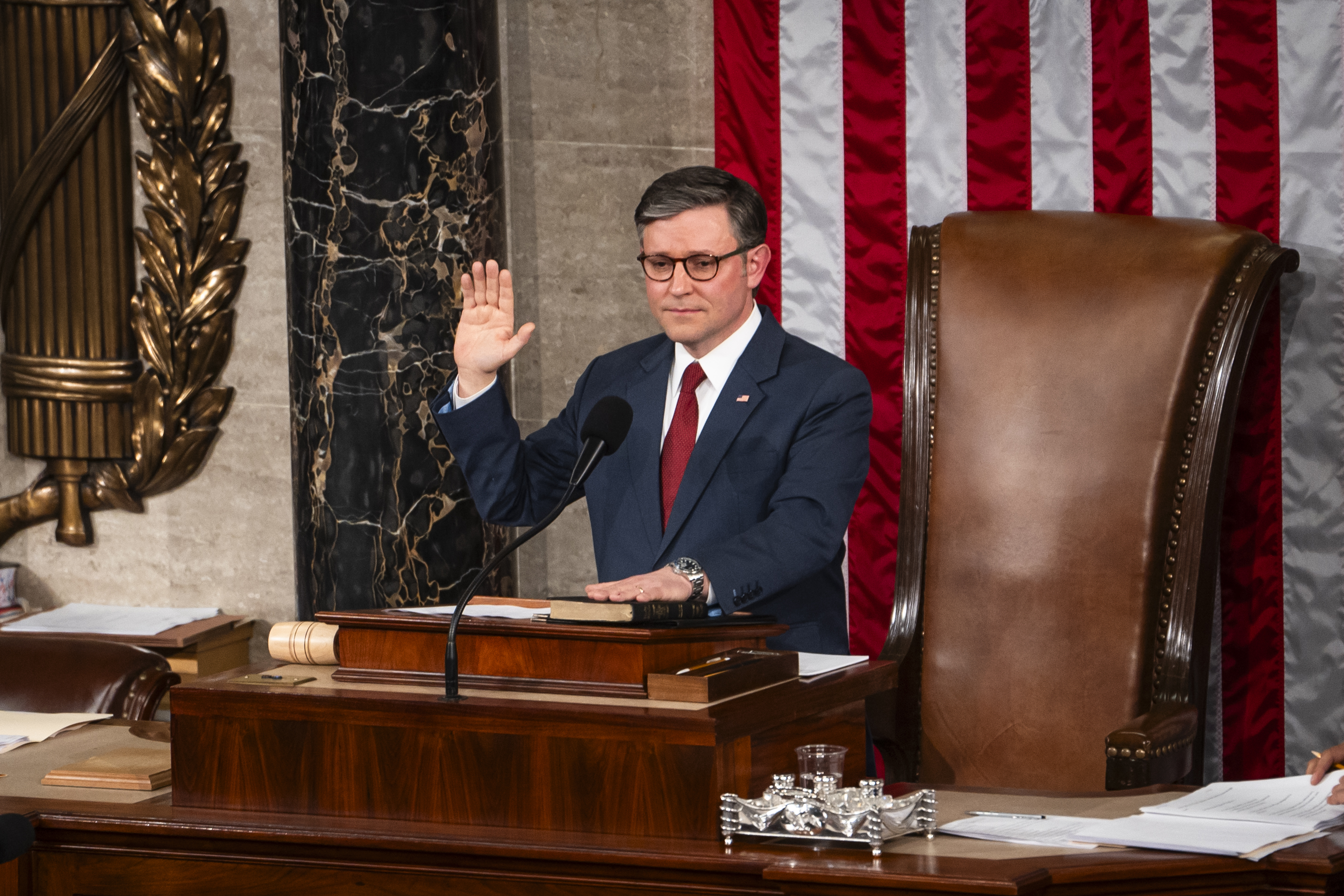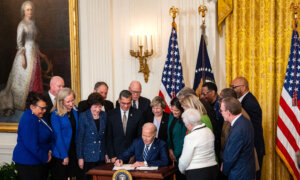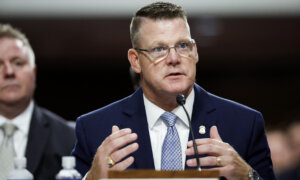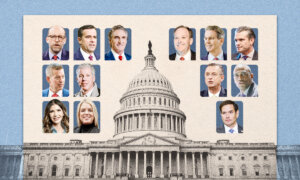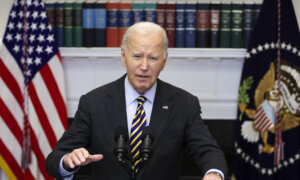WASHINGTON—Rep. Mike Johnson (R-La.) on Jan. 3 was elected to reprise his role as speaker of the House on the first ballot, tamping down a Republican mutiny that could have led the vote into multiple ballots.
Johnson defeated House Minority Leader Hakeem Jeffries (D-N.Y.) for the gavel in a 218–215 vote—the bare minimum threshold to be elected. In his acceptance speech for the post, Johnson vowed that the House would pursue an aggressive America First agenda.
“This Congress will renounce the status quo, and we will listen to the voices of the people. We will act quickly,” Johnson said, citing issues like border security, inflation, and an array of others.
President-elect Donald Trump also quickly congratulated Johnson, who he earlier endorsed to lead the House.
“Congratulations to Speaker Mike Johnson for receiving an unprecedented Vote of Confidence in Congress,” Trump wrote on his Truth Social platform.
“Mike will be a Great Speaker, and our Country will be the beneficiary. The People of America have waited four years for Common Sense, Strength, and Leadership. They’ll get it now, and America will be greater than ever before!”
In the days leading up to the vote, it seemed far from guaranteed that Johnson could pull off a win in the first round.
Despite Trump’s support for the incumbent, Johnson’s decisions on spending legislation and government surveillance programs during his first term drew criticisms from many conservatives.
Several of these critics, including Reps. Thomas Massie (R-Ky.) and Chip Roy (R-Texas), had hinted—or outright stated—that they had reservations about Johnson. Massie made clear that he was intractable in his opposition to Johnson.
Normally, that wouldn’t be a problem, but with Republicans controlling just 219 seats, one above the majority threshold, Massie’s hardline opposition meant that Johnson needed the support of all but one member of his conference to win.
For many, it was reminiscent of the situation two years before, when it took five days and 15 ballots for Rep. Kevin McCarthy (R-Calif.) to win the gavel.
Seeking to head off the challenges to his bid for the gavel ahead of the vote, Johnson released a statement promising “an end to the status quo, and a return to fiscal sanity.”
“Republicans have a mandate to implement the America First Agenda, and as Speaker, this will be my priority,” he said.
GOP Mutiny Defeated
At only three defections, Johnson was immediately in a stronger position than McCarthy, who lost 19 Republicans during the first round of voting in January 2023.Still, the vote was a nail-biter for Johnson, and he initially seemed poised to fail after Reps. Ralph Norman (R-S.C.) and Keith Self (R-Texas) joined Massie in casting ballots for other Republicans.
In the first tabulation of voting, Johnson received 216 votes, while Jeffries received 215.
Massie voted for Rep. Tom Emmer (R-Minn.), the GOP whip.
Norman, the second defector, voted for House Judiciary Committee Chairman Jim Jordan (R-Ohio), while Self followed up with a vote for Rep. Byron Donalds (R-Fla.).
Many members associated with the House Freedom Caucus also initially abstained on the first ballot, including the current chairman of the caucus, Rep. Andy Harris (R-Md.).
Other abstentions came from Rep. Andy Biggs (R-Ariz.), a former chairman of the conservative caucus and critic of Johnson, and Reps. Michael Cloud (R-Texas), Andrew Clyde (R-Ga.), Paul Gosar (R-Ariz.), and Roy.
Ultimately, each of them cast their vote at the end of the first ballot to hedge off a scenario in which Jeffries would inadvertently be elected.
With these accounted for, Johnson was still short of the 218 votes he needed. Given Massie’s hardline stance, he needed to convince both Norman and Self to change their votes.
At one point, all three were seen exiting the chamber to speak privately.
Norman later told The Epoch Times he and Self had received a call from Trump during the vote.
On that call, Trump told Norman that Johnson was the only House Republican with the “likability” to be elected speaker, Norman recalled.
Trump also promised the defectors that conservatives would be “at the table in negotiations” on legislation. Norman cited Roy as an example of one such lawmaker who could be more involved.
Conservative Demands
While Johnson was able to bring the conference’s conservatives in line behind him, they made clear that they expected Johnson to pursue a far different approach to legislating in the future.Fortunately for Johnson, almost all members of the House Freedom Caucus immediately supported him. The caucus was seen as a potential headache for Johnson in the days leading up to the vote.
Still, several members associated with the group indicated that they had reservations about Johnson.
Rep. Lauren Boebert (R-Colo.), a member of the caucus, voted for Johnson in the first round, and made clear she expected him to earn her support.
“Don’t let us down, Mr. Speaker,” Boebert said on the House floor.
Rep. Eli Crane (R-Ariz.), another conservative member of the House Freedom Caucus, backed Johnson.
In a statement on their vote, the House Freedom Caucus said, “Today, we voted for Mike Johnson for Speaker of the House because of our steadfast support of President Trump and to ensure the timely certification of his electors. We did this despite our sincere reservations regarding the Speaker’s track record over the past 15 months.”
Both the caucus and Norman—who’s also a member of the group—said they expect rapid progress on government funding, budget reconciliation, and other priorities in 2025.
“This has got to happen in the next 12–13 months, whether it’s the DOGE commission, whether it’s folks on the budget, doesn’t matter,” Norman told reporters. “We got a short time frame to make it happen.”
In their statement, the House Freedom Caucus demanded that the House be highly active over the next year and address a slate of issues ranging from border security to congressional stock trading.
Norman indicated that he had been assuaged in his conversation with Johnson, and said that Johnson’s approach differs from that of McCarthy.
“I think [Johnson] realizes there was a growing number of us that ... just weren’t happy with the use of power [with] the speakership,” Norman said, referencing a common conservative critique of how the speaker’s authority has grown since Rep. Nancy Pelosi’s (D-Calif.) time with the gavel.
Norman said Johnson promised he would “push the conservative agenda [and] push Trump’s agenda.”
Other Republicans were relieved at the outcome.
Rep. Steve Scalise (R-La.), who has served as the House majority leader since 2023, told The Epoch Times that the day’s events went “really well” for him and his constituents.
Rep. Mike Lawler (R-N.Y.), an outspoken ally of the speaker, said in a statement, “I am thrilled that the Republican Conference has re-elected Mike Johnson as Speaker of the House.
“The American people elected us to work on the issues that matter—lowering costs, securing the border, and putting the American economy back on track—and with Speaker Johnson at the helm, I’m confident we'll get it done.”
Donalds, who was nominated for House speaker by Self on the first ballot, said he has no interest in being speaker in the future.
“No, I’m good,” Donalds told The Epoch Times. “Listen, they better be careful,” he said, referring to his congressional colleagues.
